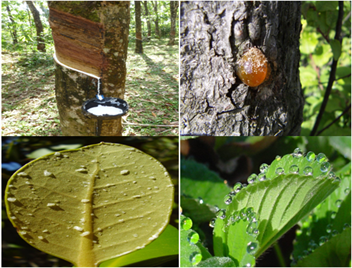Living organisms sustain life, based on certain life processes. These life processes help to regulate their daily activities. Excretion is one among them. The metabolism takes place in the cells of living organisms resulting in both useful and toxic products. The accumulation of toxins may harm the organism. Thus, the living organisms remove all these metabolic wastes from their body and this process is called excretion. Different organisms follow different modes of excretion. Let’s have a glance at excretion in plants and how excretion in plants is different from that of animals.
Excretion in Plants
Elimination of toxic and waste products from the body is called excretion. Organisms like animals have an advanced and specialized system for excretion. But plants lack a well-developed excretory system like that in animals. They do not have special organs for excretion. Thus, excretion in plants is not so complex.
Excretory products
The cellular respiration, photosynthesis, and other metabolic reactions produce a lot of excretory products in plants. Carbon dioxide, excess water produced during respiration and nitrogenous compounds produced during protein metabolism are the major excretory products in plants.
Plants produce two gaseous waste products i.e. oxygen during photosynthesis and carbon dioxide during respiration. Excretion of gaseous waste in plants takes place through stomatal pores on leaves. Oxygen released during photosynthesis is used for respiration while carbon dioxide released during respiration is used for photosynthesis.
Excess of water is also excreted from the plant body through the stomatal pores and from the surfaces of fruits and stems. The process of elimination of water is called transpiration.

Other than gaseous wastes, metabolism in plants also generates organic by-products. These wastes are stored in different forms in different parts. The gums, oils, latex, resins, etc. are some waste products stored in plant parts like barks, stems, leaves, etc. Eventually, plants shed off these parts.
The oil produced from orange, eucalyptus, jasmine, latex from the rubber tree, papaya tree, and gums from acacia, are different forms of stored waste products. Sometimes they even excrete into the soil. Excretion in aquatic plants takes place through diffusion.
Excretion in plants can be summarized as follows:
- Transpiration: Gaseous wastes and water are excreted through stomata, lenticels of the stem, and the outer surface of stems, fruits, etc.
- Storing: Some organic wastes are stored in plant parts such as barks and leaves.
- Diffusion: Aquatic plants excrete metabolic wastes through diffusion. Terrestrial plants excrete into the soil.
To know more about excretion in plants, visit BYJU’S.

Thanks
is fruits excretory product ?
No. Fruit is an energy storage structure evolved to protect and disperse seeds.
No, fruits are the reproduced seed by the plants in order to continue their species, that’s why fruits have seed and same goes for the flowers?
Yes you are totally right and yes thanks byjusssss ??????!!!
Is GUTTATION is a excretory method?
Guttation is the process of exudation of water droplets from hydathodes. Water is excreted here. It is one of the many ways through which plants excrete.
How do plants exerts their waste??
Excretory products of plants are water, oxygen, carbon dioxide, and other organic and inorganic compounds. Leaves, also known as excretophores, are used to excrete organic and inorganic compounds that occur with yellowing of leaves. Plants gradually eliminate wastes through withering. Processes of Transpiration and photosynthesis are used to excrete oxygen and water through stomatal pores in leaves. Some chemicals are deposited in the stems, trunks which are deemed wastes. Few plants also secrete by depositing wastes into the soil via the roots.
How is solid and gaseous waste excreted in humans?
All metabolic wastes are excreted through the kidneys in the form of water solutes. However, carbon dioxide is an exception and it is excreted along with water vapour through the lungs.
Why is it necessary for plants to excrete waste products?
do all plants excrete in the soil?
It’s helpful ?. Thank you.
what are some examples of organic plant wastes
what are some similarities in human and flowering plants excretory products?????????
Nice article and useful information shared
Thanks.
THANKS BYJU’S